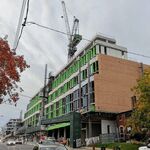http://www.thestar.com/business/rea...f_toronto_vancouver_condos_investorowned.html
CMHC report says just 17.1% of Toronto, Vancouver condos investor-owned
New survey of condo market sure to be criticized for leaving out more than it includes
By: Susan Pigg Business Reporter, Published on Fri Aug 08 2014
Canada’s federal housing agency has tried — yet again — to pull back the curtain on Toronto’s and Vancouver’s condo market and says a new survey of condo owners shows just 17.1 per cent are investors and 82.9 per cent own the unit in which they live.
The survey released Friday by the Canada Housing and Mortgage Corp. quickly came under criticism by some housing watchers, especially in Toronto where investors are generally believed to control far more — at least 40 per cent — of the new condo market.
One concern is that the survey of 42,426 households comes from a CMHC database of condo renters and owners in existing and often older buildings.
It doesn’t shed any light on the extent of foreign investment — the number of wealthy people from areas such as Asia, Russia and the Middle East who are simply looking to park their money in offshore real estate.
Nor does it include investors who own a condo in Toronto or Vancouver, but don’t live in those cities.
Most critically, it doesn’t include the mass of buyers who’ve purchased suites since the explosion of condo construction in the last five to seven years, often in hopes of making money.
Many of those projects have yet to start, are still under construction or have yet to occupy. While the Canada Revenue Agency routinely asks developers for their sales lists, to track buyers who may be flipping units and not paying capital gains, CMHC made no such efforts to actually track down owners.
Analysts simply relied on its existing database, usually used to assess rents and the strength of the rental market, and surveyed owners from that.
“That’s the biggest issue I see with this survey,†said former CMHC analyst Shaun Hildebrand, now a senior vice president with Toronto-based condo research firm Urbanation.
“The more important question for the market is what does that huge wave of (more recent) investors intend to do, how long do they plan to hold their units, what equity do they have in the units? It’s those individuals — who may be first-time or amateur investors — who we don’t know a lot about.â€
CMHC’s 2013 Condominium Owners Survey found that about half those 17.1 per cent of condo owners who are investors rent their units out. Another third said they were living in the unit themselves or had family living there.
Almost 60 per cent — 58.4 per cent — expect to hang onto their condo for more than five years. Another 17.9 per cent plan to hold for 2 to 5 years, 7.6 per cent for less than two years and 16.1 per cent “did not know or answer,†says CMHC.
About 12 per cent of respondents said they bought a condo with plans to sell for a profit within a year.
Some 42.1 per cent of the 42,426 households surveyed in August and September of last year, had no mortgage on that secondary property.
“It’s not a complete picture. (The number of) foreign investors is a really, really tough one to get at. They don’t live here and we don’t have the power to survey them,†said Bob Dugan, chief economist at CMHC’s market analysis centre.
“This survey is a starting point for us. We’ve identified data gaps (in understanding the national housing market) and condo investors is one that we’re trying to work toward filling. This is one step in that direction, but it’s not the final destination.â€
CMHC first tried to do this survey in 2012, but decided not to release the results, fearful they didn’t properly reflect the market. In another effort, it released a survey last December that also raised questions because it found just 23 per cent of Toronto’s condo stock was being rented out in 2012 by investor-owners and 26 per cent in Vancouver.
CIBC deputy-chief economist Benjamin Tal has raised concerns recently about the lack of enough data on the housing market, particularly the fast-growing condo market. He called the survey “a great and welcomed move.â€
But it assesses the “stock†rather than the “flow†of the condo market, he notes.
“When you talk to developers in the GTA and even in many pockets in Vancouver, they tell you that 70 per cent of (condo) presales and close to 50 to 60 per cent of final sales are by investors.â€
The “picture that is emerging from this survey is much more positive than the popular perception,†said Tal, calling the 17.1 investor figure “much smaller than expected.†Market watchers believe it’s critical to get a better handle on the investor-owned component of the market as they may be more prone to engage in a massive sell-off if the market heads for a downturn.
So far, that has not happened. In fact, housing watchers have been surprised at the strength of the condo market, which has become, in essence, the major supply of rental housing, especially in Toronto where almost no new apartment buildings have been constructed in the last few decades.




